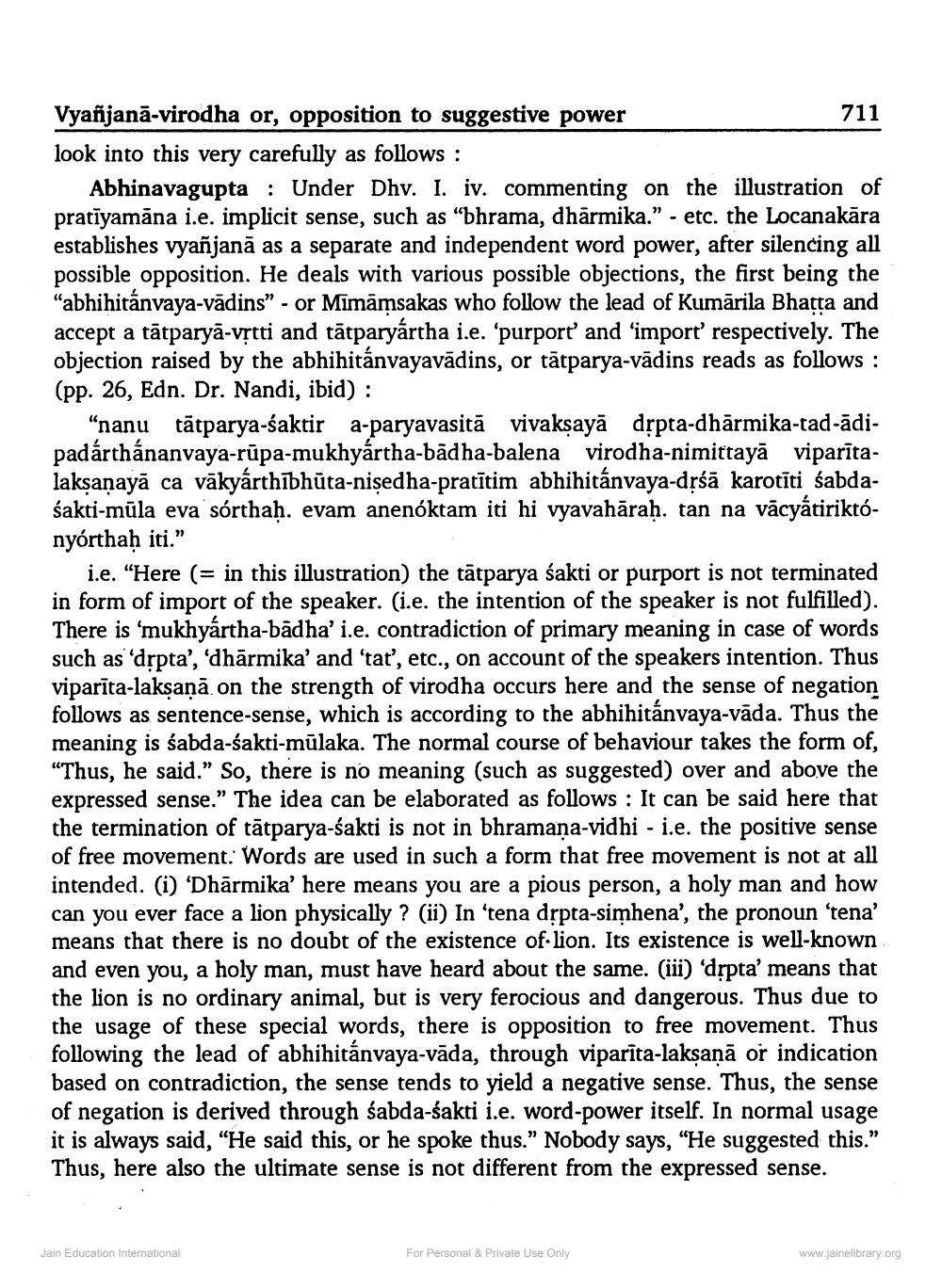________________
Vyañjanā-virodha or, opposition to suggestive power
711 look into this very carefully as follows : Abhinavagupta : Under Dhy. I. iv. commenting on the illustration of
māna i.e. implicit sense, such as "bhrama, dharmika.” - etc. the Locanakāra establishes vyañjanā as a separate and independent word power, after silencing all possible opposition. He deals with various possible objections, the first being the "abhihitánvaya-vādins” - or Mimāmsakas who follow the lead of Kumārila Bhatta and accept a tātparyā-vṛtti and tātparyártha i.e. 'purport' and 'import' respectively. The objection raised by the abhihitánvayavādins, or tātparya-vādins reads as follows: (pp. 26, Edn. Dr. Nandi, ibid) :
"nanu tātparya-śaktir a-paryavasitā vivaksayā dịpta-dhārmika-tad-ādipadárthánanvaya-rūpa-mukhyártha-bādha-balena virodha-nimittayā viparītalaksanayā ca vākyárthībhūta-niședha-pratītim abhihitánvaya-dịśā karotīti śabdaśakti-mūla eva sórthaḥ. evam anenoktam iti hi vyavahāraḥ. tan na vācyátiriktónyórthaḥ iti."
i.e. "Here (= in this illustration, the tātparya sakti or purport is not terminated in form of import of the speaker. (i.e. the intention of the speaker is not fulfilled). There is ‘mukhyártha-bādha' i.e. contradiction of primary meaning in case of words such as 'drpta', 'dhārmika' and 'tat', etc., on account of the speakers intention. Thus viparīta-laksaņā on the strength of virodha occurs here and the sense of negation follows as sentence-sense, which is according to the abhihitánvaya-vāda. Thus the meaning is sabda-śakti-mülaka. The normal course of behaviour takes the form of, "Thus, he said." So, there is no meaning (such as suggested) over and above the expressed sense." The idea can be elaborated as follows : It can be said here that the termination of tātparya-sakti is not in bhramana-vidhi - i.e. the positive sense of free movement. Words are used in such a form that free movement is not at all intended. (i) 'Dhārmika' here means you are a pious person, a holy man and how can you ever face a lion physically ? (ii) In ‘tena dịpta-simhena', the pronoun ‘tena' means that there is no doubt of the existence of lion. Its existence is well-known and even you, a holy man, must have heard about the same. (iii) drpta' means that the lion is no ordinary animal, but is very ferocious and dangerous. Thus due to the usage of these special words, there is opposition to free movement. Thus following the lead of abhihitánvaya-vāda, through viparīta-lakṣaṇā or indication based on contradiction, the sense tends to yield a negative sense. Thus, the sense of negation is derived through śabda-śakti i.e. word-power itself. In normal usage it is always said, “He said this, or he spoke thus.” Nobody says, “He suggested this.” Thus, here also the ultimate sense is not different from the expressed sense.
Jain Education Interational
For Personal & Private Use Only
www.jainelibrary.org




